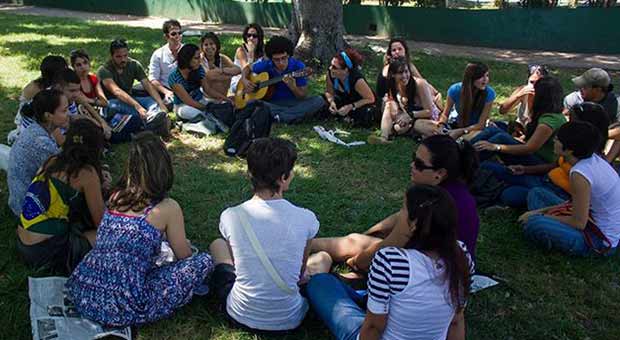The easy thing to do comes afterwards, when you create a result to ratify a fact. The easiest thing to do is to blame connectivity, the government, indolence and prices. The regular thing is to turn to common positions and hide behind thatsame old phrase: “it is always the same”.
The difficult thing to do is to overcome pretexts and set an idea in motion. The hard thing is not to be part of those arguments, join the club, and wait for a spring Sunday for 50 Cubans to engage in a Book release summoned from Facebook and to take any book, this time, in return for nothing.
The first experience emerged with the passing away of Teresita Fernandez. In the first event, which was not summoned institutionally, more than a hundred people played a leading role that still remains in the collective memory. Now, on the occasion of no particular event, an idea moves from the institutional sphere and is put into practice, with more or less participation.
Sometimes it seems Cuba is condemned to not exercising the citizens’ initiative, not being a static mass of people that only moves at the pace of military bands, hymns or mottos, but these experiences prove it only demanded an idea, a common frame of interests, and a bit more.
The use of social networks as platforms for summoning people is obviously limited to the groups that have access to it. In this sense, journalists, science professionals or teachers have an advantage, but it is undeniable that this kind of experiences is significant, even with their limitations.
These two actions appeared in a moment of instauration of rights that had been violated for many years. It is not possible to affirm that this is only the network, the access and the information, it is a set of transformations that are changing the way citizens express themselves socially. For Cuba, this is the first time that a public platform for private use, internet, supersedes the media for its use in Cuban communications and frees messages from its political character.
In fact, such a valid experience like Rene’s call to wear a yellow ribbon for the release of his fellowmen (Rene is one of the five Cuban anti-imperialist fighters unjustly imprisoned in the US),lost its natural manner when traditions and habits by certain officials surprised by people’s spontaneity and used to anti-imperialist superproductions, attempted to turn Rene’s idea into “the government’s”.
Journalist Rafael González Escalona, who came up with the idea of the Book release states: “Teresita was the first mobilization experience I got involved in from Facebook, which, as Milena Recio would say, resulted from the dissatisfaction of some people with the limited coverage by the media of her death”. He also added: “in terms of calls made through the social networks in Cuba we are far behind, mainly due to the narrow connection access. It is vital to rescue citizens’ initiatives, which have been minimized by the idea that the State is the responsible for everything. The social networks have been a magnificent tool to rescue this initiative, they are meant for connecting people in social processes of all kinds, from a party to a revolution, its virility and capacity for summoning people are huge, as it is the citizens themselves who turn words into facts”.
The Book release was reflected by the Cuban digital press, which doesn’t mean wide coverage. The captivity of digital platforms in Cuba is a snake that bites its own tail, social network users are the same than those of the media and even tough alternative information transmission mechanisms may be established, they are not enough. The spirit of a call cannot be reflected on a text saved in a pen drive.
Engagement gets real with the release of the call, with comments, proposals, notices, etc. and it ends the same way. The physical act is part of a whole and many times the debates in the networks are more relevant that the results of the event itself.
These kinds of calls establish a participation dynamics that reveals the fragility of certain areas not covered by the State: cultural spaces; social adhesion expressions; specific campaigns or strategic actions find initiatives in the citizens and a space of their own for organization and calls in the social network.
These are spontaneous spaces but they are born from collective commitments, whether about an idea or a project or a specific need of saying something. The need is vital, that’s what makes people go to a park to give a book away, and not listen to a buzzing that doesn’t represent them. Understanding the individual commitment with public participation is essential in order to understand the social restructuring processes that the country is living today.
Lots of similar initiatives will emerge as the Cuban government implements massive access strategiesand understands that the networks are a necessary and useful tool. The scandalous barrier of prices also hinders the use of text messages through mobile phones and the lack of internet access from home is unfortunately something inexplicable and impossible to understand.
The Book release has proven that it is possible to make difficult things happen and that the easy is not so comfortable any more.










